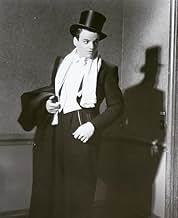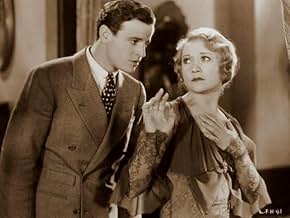Adicionar um enredo no seu idiomaFather hires a woman to lure his son away from a gold digger.Father hires a woman to lure his son away from a gold digger.Father hires a woman to lure his son away from a gold digger.
- Direção
- Roteiristas
- Artistas
- Sir James - Lawyer
- (não creditado)
- Freddy
- (não creditado)
- Direção
- Roteiristas
- Elenco e equipe completos
- Produção, bilheteria e muito mais no IMDbPro
Avaliações em destaque
In days past, this would have been called a woman's picture. Certainly the flick's dominated by talk-talk, interior decor, and thwarted desires. The plot, however, picks up in the last ten-minutes, with a rather surprise ending. Note too how the script shies away from using any synonym for "prostitute", rather surprising for a pre-Code production.
Anyway, as the spunky young June, Compson carries the show, though pairing her with the aging and zombified Sir Gerald remains a stretch. And get a load of Edgar Norton as the officious man-servant Dobbs; he's enough to re-think the whole idea of household help. Except for the memorable last shot, there's nothing special here, especially for impatient guys waiting for Tom Mix and his six-guns.
This film flirts with ideas it never names, and although Compson flings herself between virtuous and tough-as-nails, the actual defining moment comes when diminutive Daphne Pollard, as a landlady, bursts into song while scrubbing the floors. The song she sings in her warbling Australian-Cockney voice is the chorus to "She Was Poor But She Was Honest," a British musical hall favourite that may have begun life as a genuinely tragic Victorian lament, but which by World War I had become a burlesque filled with outrageous verses declaimed with mock portentousness.
It's the same the whole world over It's the poor what gets the blame It's the rich what get the pleasure Ain't it all a blooming shame?
Look up Elsa Lanchester's version on You Tube and listen closely to the lyrics.
There are countless verses, but these two, which appear in many versions, form an actual gloss on the plot:
She was poor but she was honest, Victim of the squire's whim; First 'e loved 'er, then 'e left 'er And she lost 'er name through 'im.
Then she ran away to London For to 'ide 'er grief and shame; But she met another squire And she lost 'er name again.
I wonder if Daphne Pollard improvised the singing of that song or if it was really in the script. Either way, it certainly fits.
Você sabia?
- CuriosidadesThe 1,000 pounds ($5,000) that Sir Gerald offers to pay June would equal $4,550 at the time, which equates to about $92,000 in 2023.
- Citações
Sir Gerald Courtney: Just see to the aperitifs, will you?
[Dobbs, the butler, walks out of the frame and returns with a tray upon which is a carafe, presumably containing sherry]
Sir Gerald Courtney: Dobbs, you're... you're downright Victorian. We must have cocktails, Dobbs, cocktails!
Dobbs: [horrified] N-not cocktails, sir!
Sir Gerald Courtney: Yes. Now don't tell me that it isn't British. You're deplorably behind the times. I drink 'em m'self. What's more, I can mix 'em. Mix is the word.
Dobbs: They tell me they even put *ice* in them in America.
Sir Gerald Courtney: Yes, well, I don't think we'll go quite that far.
Principais escolhas
Detalhes
- Data de lançamento
- País de origem
- Idioma
- Também conhecido como
- A Lady for Hire
- Locações de filme
- Empresa de produção
- Consulte mais créditos da empresa na IMDbPro
- Tempo de duração
- 1 h 12 min(72 min)
- Cor





























